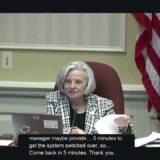It’s shaping up to be a busy November election for local marijuana reform in Texas, with activists in yet another city announcing that officials have certified signatures to place a decriminalization initiative on the ballot in Lockhart.
This marks the second city where signatures have been verified this month alone to secure ballot placement for such a marijuana reform proposal, coming about a week after it was confirmed that Dallas voters will get the chance to decide on cannabis decriminalization.
Activists in Bastrop also recently announced that they’ve turned in what they believe to be enough signatures to put a marijuana decriminalization initiative on that city’s local November ballot.
Ground Game Texas, which has spearheaded a largely successful local decriminalization push in the state over recent years, partnered with the advocacy group Mano Amiga on the Lockhart measure, turning in more than double the required signatures in May.
The organization announced on Monday that the city secretary official certified the signatures last week.
“Lockhart marks the second collaboration between Mano Amiga and Ground Game Texas—in 2022, we won an overwhelming victory in San Marcos’s November election,” Catina Voellinger, executive director of Ground Game Texas, said in a press release. “It’s more than past time for this community to have the same freedom from unnecessary arrests enjoyed by those in Austin and San Marcos.”
Relatedly, advocates scored another win in San Marcos last week after a Texas district judge dismissed a lawsuit from the state’s Republican attorney general that sought to overturn the local decriminalization ordinance.
Paxton filed a lawsuit in January challenging local decriminalization laws that were enacted in five cities: Austin, San Marcos, Killeen, Elgin and Denton. A different district judge had overturned the suit in Austin last month.
“While this campaign is working to end needless arrests for cannabis possession, keep community members free from the harmful collateral consequences of an arrest and save scarce city resources, we are also working to build community power in Lockhart,” Elle Cross, campaign director of Mano Amiga, said. “This policy process is as democratic as it gets, and we’re hopeful that this campaign will demonstrate to our community the power we hold as a collective and the future we can build alongside one another.”
The purpose section of the Lockhart initiative similarly says that the objective of decriminalization is “carefully allocating scarce city resources, reducing the risk of discriminatory enforcement practices, and focusing city resources on the highest priority public safety concerns.”
“Unless and until a binding act of a state or federal court requires otherwise, the Lockhart Police Department shall not make any arrest or issue any citation for Class A or Class B misdemeanor marijuana possession, except in the limited cases described by this policy,” it says.
It also stipulates that, if the reform is challenge by state or federal authorities, it would simply become the default policy of the city to make marijuana possession among the jurisdiction’s lowest law enforcement priorities.
Under the measure, the city would further be barred from conducting THC testing of cannabis products to determine whether it meets the definition of illegal marijuana or legal hemp.
“Lockhart police shall not consider the odor of marijuana or hemp to constitute probable cause for any search or seizure, except in the limited circumstances of a police investigation pursuant to Section 12.05,” another provision says.
Meanwhile, in a setback from advocates, voters in Lubbock rejected a separate cannabis reform initiative last month.
Gov. Greg Abbott (R) has separately lashed out against the municipal cannabis reform efforts.
“Local communities such as towns, cities and counties, they don’t have the authority to override state law,” the governor said in May “If they want to see a different law passed, they need to work with their legislators. Let’s legislate to work to make sure that the state, as a state, will pass some of the law.”
He said it would lead to “chaos” and create an “unworkable system” for voters in individual cities to be “picking and choosing” the laws they want abide by under state statute.
Abbott has previously said that he doesn’t believe people should be in jail over marijuana possession—although he mistakenly suggested at the time that Texas had already enacted a decriminalization policy to that end.
Paxton had used more inflammatory rhetoric when his office announced that it was suing the five cities over their local laws decriminalizing marijuana, vowing to overrule the “anarchy” of “pro-crime extremists” who advocated for the reform.
In general, the measures that have already been enacted in Austin, Denton, Elgin, Harker Heights, Killeen and San Marcos prevent police from making arrests or issuing citations for Class A or B misdemeanor cannabis possession offenses, unless it’s part of a high priority felony investigation for narcotics or violent crime.
Shortly after voters in Harker Heights approved their measure, the city council overturned the ordinance over concerns that it conflicted with state law. But activists collected signatures for another initiative and successfully repealed the repeal last year—though officials have still refused to move forward with implementing the will of voters.
In November, Ground Game released a report that looked at the impacts of the marijuana reform laws. It found that the measures will keep hundreds of people out of jail, even as they have led to blowback from law enforcement in some cities. The initiatives have also driven voter turnout by being on the ballot, the report said.
Another cannabis decriminalization measure that went before voters in San Antonio last May was overwhelmingly defeated, but that proposal also included unrelated provisions to prevent enforcement of abortion restrictions.
—
Marijuana Moment is tracking more than 1,500 cannabis, psychedelics and drug policy bills in state legislatures and Congress this year. Patreon supporters pledging at least $25/month get access to our interactive maps, charts and hearing calendar so they don’t miss any developments.![]()
Learn more about our marijuana bill tracker and become a supporter on Patreon to get access.
—
At the state-level last year, the Texas House of Representatives passed a series of bills to decriminalize marijuana, facilitate expungements and allow chronic pain patients to access medical cannabis as an opioid alternative. But they ultimately stalled out in the Senate, which has been a theme for cannabis reform measures in the conservative legislature over several sessions.
The House passed similar cannabis decriminalization proposals during the past two legislative sessions, in 2021 and 2019.
Separately, a Texas Democratic senator brought the issue of marijuana legalization to the Senate floor last May, seeking to attach to an unrelated resolution an amendment that would’ve allowed Texans to vote on ending prohibition at the ballot box. But the symbolic proposal was ultimately shut down. Lt. Gov. Dan Patrick (R) agreed to another member’s point of order, deeming the cannabis amendment not germane to the broader legislation.
Three in five Texans, including a plurality of Republicans, support legalizing marijuana, according to a survey released in May.
Another poll released in 2022 found that nearly three in four Texas voters (72 percent) support decriminalizing marijuana. More than half (55 percent), meanwhile, said they’re in favor of broader legalization. Seventeen percent said it shouldn’t be legal at all.
Last March, the same institution similarly showed that a majority of Texas voters feel that the state’s marijuana laws should be “less strict.”




















